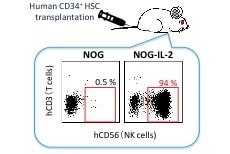Mar 28 2017
Researchers affiliated with the Kawasaki INnovation Gateway at SKYFRONT, have successfully developed a humanized mouse model showing that so-called NK cells that directly attacking tumors, can survive and maintain function in vivo. These results are reported in the Journal of Immunology and are important for developing cancer treatments.

Humanized mice were generated by transplanting 2.5 x 104 human cord blood-derived CD34+ HSC cells into irradiated NOG-IL-2 mice. After human CD34+ cell transplantation, human NK cells remarkably differentiated in NOG-IL-2 mice.
Further information about science and technology projects at Kawasaki City is available in the Kawasaki SkyFront iNewsletter that highlights research being conducted by scientists and industries affiliated with Kawasaki INnovation Gateway at SKYFRONT (KING SKYFRONT)—the City’s flagship science and technology hub launched in 2013 to focus on open innovation in the life sciences and environment.
Natural killer (NK) cells which belong in innate immunity, play an important role for defense against invading pathogens and microbes. NK cells make up around 5-20% of the white blood cells circulating in the bloodstream and are also critical cells for ‘immunosurveillance’ in the process of cancer development. They are highly potent, and are capable of directly attacking tumors. Indeed, cancer treatments using this capacity of NK cells have already been developed.
However, to-date, studies of human NK cell have been performed in vitro and as a result their function in vivo is less well-understood. Therefore, in vivo models showing that NK cells survive and maintain function long-term are eagerly desired.
This time, a research group of immunology Laboratory of the Central Institute for Experimental Animals, Kawasaki City, and Keio University, School of Medicine has successfully developed a humanized mouse model using NOG-IL-2 Tg mice that support to develop and maintain human NK cells suitable for in vivo cell function studies.
While creating various mouse strains for generating humanized mouse models, the research team developed a new NOG mouse sub-strain, NOG-hIL-2 expressing the human cytokine IL-2, which supports the proliferation of T-cells. Unexpectedly, they found that human NK cells predominantly developed in the mice after transplantation of human hematopoietic stem cells. In addition, the NK cells could maintain the function and survived for the long term in the mice.
The research team confirmed that these NK cells strongly inhibited tumor growth in both in vivo and in vitro experiments. The unique mouse model will be invaluable for investigating both biological and pathological functions of human NK cells in vivo.